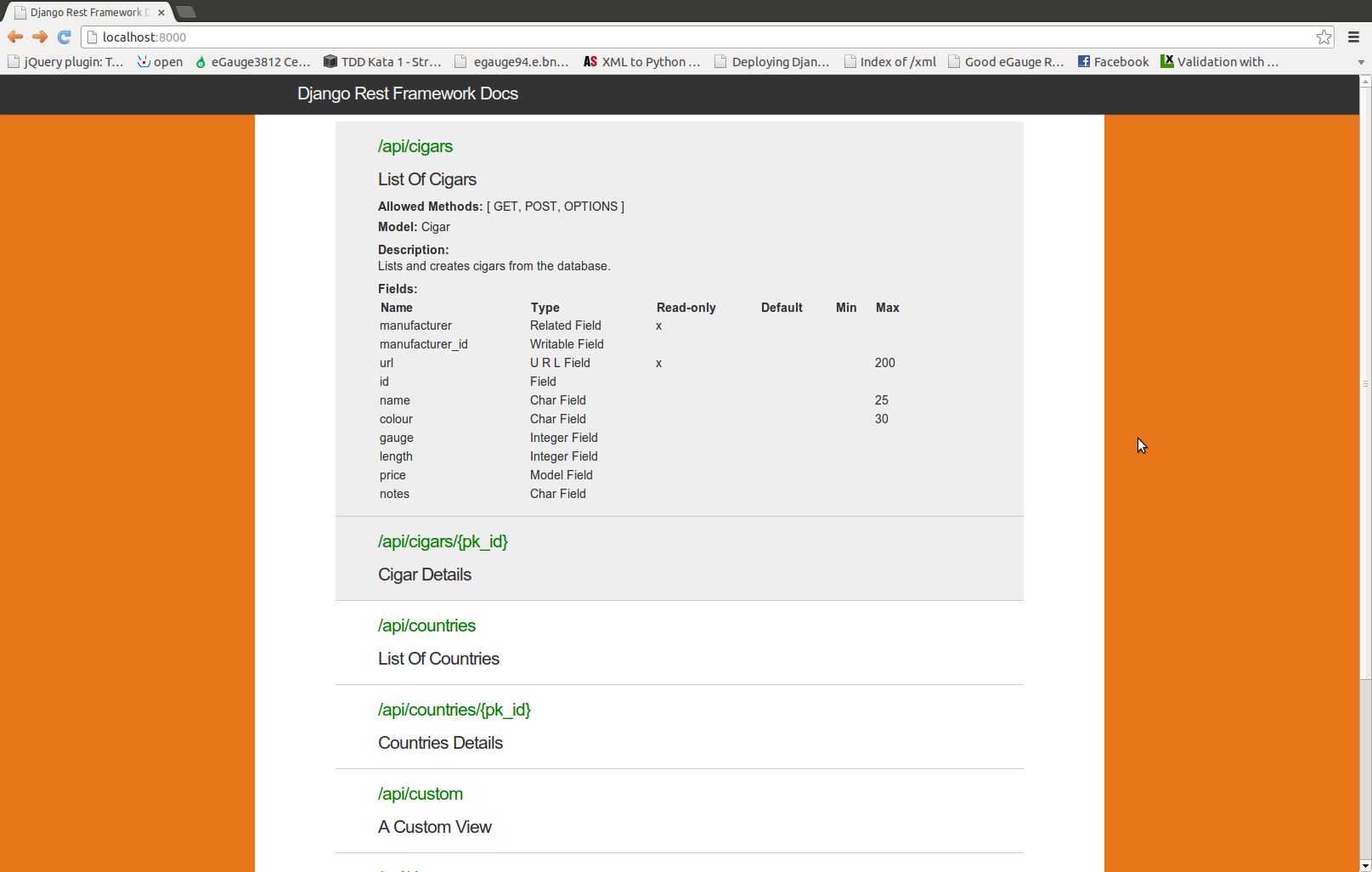Rest Framework Docs is an application built to produce an inventory and documentation for your Django Rest Framework v2 endpoints.
From pip:
pip install django-rest-framework-docs
From the source:
- Download the tarball: django-rest-framework-docs-0.1.6.tar.gz
- Extract files
- Run python setup.py install
-
Add "rest_framework_docs" to your INSTALLED_APPS setting like this:
INSTALLED_APPS = ( ... 'rest_framework_docs', )
-
Include the polls URLconf in your project urls.py like this:
url(r'^rest-api/', include('rest_framework_docs.urls')),- View /rest-api/ to see your Django Rest Framework endpoints
- Django [1.4, 1.5]
- Django Rest Framework (2.1, 2.2, 2.3)
The Django Rest Framework Docs scans your projects URL patterns for endpoints inheriting from Django Rest Framework views. It extracts comments, variables and methods from your code to generate documentation. Here is what is being tracked to generate documentation:
- The name attribute from the URL pattern is used as the title. The following will produce a title of 'List of Countries'
url(r'^api/countries/?$', views.Countries.as_view(), name='list_of_countries'),- The class doctsring is used as the description:
class Countries(APIView):
"""
This text is the description for this API
"""-
The class model. (ie. User)
-
Allowed methods (GET, POST, PUT, etc.)
-
Serializer properties. If your API uses a serializer, the properties are listed
-
Custom parameters. It is possible to customize a parameter list for your API. To do so, include a key-value pair in the docstring of your API class delimited by two hyphens ('--'). Example: 'start_time -- The first reading':
class Countries(APIView):
"""
This text is the description for this API
param1 -- A first parameter
param2 -- A second parameter
"""Django REST Framework Docs comes with a default template which you may override.
Another option is to create an API for documentation that can be consumed on a different platform (ie. mobile).
import json
from rest_framework.response import Response
from rest_framework.views import APIView
from cigar_example.restapi import urls
from rest_framework_docs.docs import DocumentationGenerator
class ApiDocumentation(APIView):
"""
Gets the documentation for the API endpoints
"""
def get(self, *args, **kwargs):
docs = DocumentationGenerator().get_docs()
return Response(json.loads(docs))By default, Django REST Framework Docs scans all your URL patterns and extracts those which inherit from the base rest_framework.views.APIView. You may choose to explicitly specify which URL patterns are to be included in the documentation by providing the urlpatterns to the DocumentationGenerator constructor.
from yourproject.myapp import urls
docs = DocumentationGenerator(urls.urlpatterns).get_docs()Included is an example project called cigar_example. It contains both Model-based
and custom API views to demonstrate the different behaviours. I also included an API of the documentation,
that is, the data parsed by the generator in JSON format (api/docs).

Please contribute to improve this tool!
Many thanks to Tom Christie for developing the Django Rest Framework - a tool I use everyday.
- Bugfix when url patterns property 'name' is None
- Now supports Django Rest Framework v2.3
- Backwards compatibility
- Improved URL importing: included URL modules now show the full URL with prefix
- Borrowing URL "restification" from Django's admin docs
- General refactoring
- Wrote a few tests, more need to be written
- URL import bug resolved
- Now possible to use URL patterns using include Example: (r'', include('project.some_app.urls')),
- Fixed trailing $ sign in the URL pattern regex
- Changed URL pattern to show docs at index
- Added example Django REST application called cigar_example.
- Minor CSS changes
- Fixed setup.py requirements to require django>=1.4
- Fixed extra spaces in serializer fields regex (ie. U R L => URL)
- Marc Gibbons (@marcgibbons)
- Scott Mountenay (@scottmx81)
- @swistakm
- Peter Baumgartner (@ipmb)
- Marlon Bailey (@avinash240)
Copyright (c) 2013, Marc Gibbons All rights reserved.
Redistribution and use in source and binary forms, with or without modification, are permitted provided that the following conditions are met:
- Redistributions of source code must retain the above copyright notice, this list of conditions and the following disclaimer.
- Redistributions in binary form must reproduce the above copyright notice, this list of conditions and the following disclaimer in the documentation and/or other materials provided with the distribution.
THIS SOFTWARE IS PROVIDED BY THE COPYRIGHT HOLDERS AND CONTRIBUTORS "AS IS" AND ANY EXPRESS OR IMPLIED WARRANTIES, INCLUDING, BUT NOT LIMITED TO, THE IMPLIED WARRANTIES OF MERCHANTABILITY AND FITNESS FOR A PARTICULAR PURPOSE ARE DISCLAIMED. IN NO EVENT SHALL THE COPYRIGHT OWNER OR CONTRIBUTORS BE LIABLE FOR ANY DIRECT, INDIRECT, INCIDENTAL, SPECIAL, EXEMPLARY, OR CONSEQUENTIAL DAMAGES (INCLUDING, BUT NOT LIMITED TO, PROCUREMENT OF SUBSTITUTE GOODS OR SERVICES; LOSS OF USE, DATA, OR PROFITS; OR BUSINESS INTERRUPTION) HOWEVER CAUSED AND ON ANY THEORY OF LIABILITY, WHETHER IN CONTRACT, STRICT LIABILITY, OR TORT (INCLUDING NEGLIGENCE OR OTHERWISE) ARISING IN ANY WAY OUT OF THE USE OF THIS SOFTWARE, EVEN IF ADVISED OF THE POSSIBILITY OF SUCH DAMAGE.
